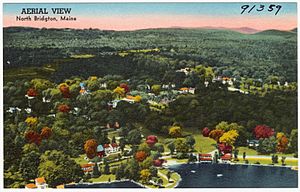North Bridgton, Maine facts for kids
North Bridgton is a small village located in the town of Bridgton, in Cumberland County, Maine, United States. It sits just west of the beautiful Long Lake and south of the town of Harrison. This quiet village holds a special record: it has the highest recorded temperature in Maine, reaching a hot 105 degrees Fahrenheit!
Contents
Discovering North Bridgton
North Bridgton is a charming place with a rich history. It's known for its peaceful setting near Long Lake, which is a popular spot for outdoor activities. The village offers a glimpse into Maine's past and present.
A Glimpse into History
The story of North Bridgton began a long time ago. In 1768, the land where North Bridgton now stands was undeveloped. It was given by the Massachusetts General Court to a group of people, or "proprietors," led by a man named Moody Bridges. The Massachusetts General Court was like the government of Massachusetts at that time. The first settlers arrived in 1770, and one of the very first buildings they put up was a tavern, which was a place for travelers to eat and stay.
Bridgton Academy: A Special School
One of the most important places in North Bridgton is Bridgton Academy. This is a special school for boys that helps them get ready for college. It's a "college-preparatory" school, meaning it focuses on preparing students for higher education. The academy has been a part of the North Bridgton community for many years.
The Railroad's Past
Long ago, North Bridgton was connected to other towns by a special train line called the Bridgton and Saco River Railroad. This was a "narrow-gauge railway," which means its tracks were closer together than regular train tracks. It was built to carry goods and people through the area.
An important part of this railway was an iron bridge built in 1898. It was made by the Berlin Iron Bridge Company and crossed Stevens Brook. This bridge was one of the last remaining iron bridges from Maine's narrow-gauge railways. Today, it's no longer in use in North Bridgton. It was saved by a collector and is now being restored by the Maine Narrow Gauge Railroad Museum in Portland, so people can learn about its history.
 | Aurelia Browder |
 | Nannie Helen Burroughs |
 | Michelle Alexander |


